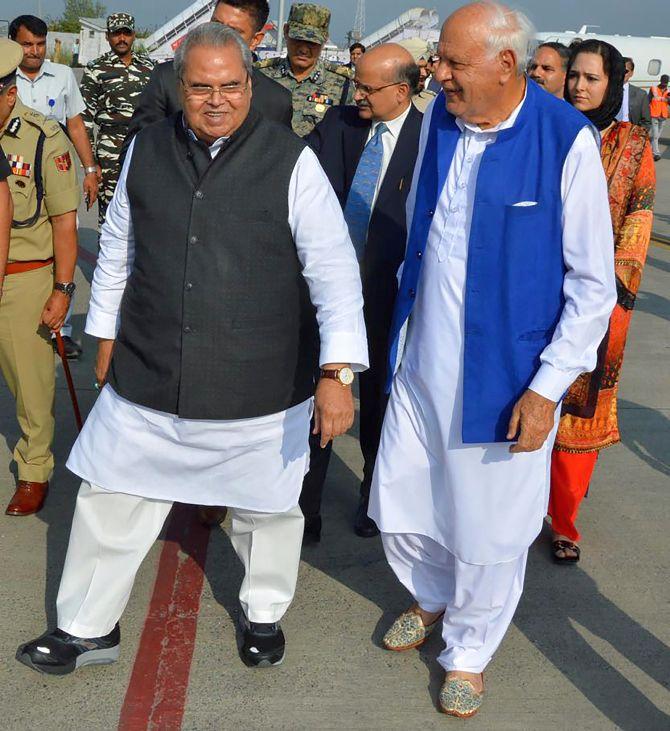
In a bid to build bridges between Raj Bhavan and the Hurriyat Conference, Jammu and Kashmir Governor Satya Pal Malik on Tuesday, January 15, reached out to the separatist leaders urging them to apprise him directly of the cases of "atrocity and injustice" to common people that they may come across.
"I have a message for the Hurriyat that they should not consider me as an alien," Governor Malik told PTI in an interview.
"As far as the Hurriyat is concerned, I have respect for them, even though their ideology is different from mine. They have a different ideology and I have a different one," the governor added.
Promising to treat the Hurriyat leaders' complaints with due urgency, the governor said, "If they (the Hurriyat) feel there is any atrocity (by troops or the police), they can contact me on phone or send a person to me."
"I will treat them (and their complaints) the way I am treating the rest of the people," said the governor, maintaining that he has opened up Raj Bhavan for all.
In his first-ever statement aimed at building bridges between Hurriyat leaders and Raj Bhavan, Malik also expressed hope that "at some level, there will be talks too" with them at some time.
Explaining that he has always been hearing out the people of Jammu and Kashmir, Malik said, "I take all calls including those from common people of the state. My mobiles and WhatsApp have never been silent. All those complaints which come to me on WhatsApp, I have tried to address them."
The governor even attended a few calls from general public during the interview itself.
Malik said he even often sends officials from Raj Bhavan to collect the complaints of aggrieved individuals, even if they may not be so pressing or urgent.
Malik emphasised that in his dealings, his opinion is based not merely on official briefings but on the narratives of the common people as well.
"I have met all political leaders and keep meeting them regularly," he said, adding he has also met several delegations of common people and youth groups, "opening himself to them and hearing them out".
"There is a need to establish contact with them and work according to their aspirations so that they understand that the Centre is not against them," he added.
Many in Kashmir believe he needs to stop talking so much. But they are wrong, says Aditi Phadnis.
J&K's governor is intelligent enough to know what to say when.
A new book on Jammu and Kashmir's educational policy for the future was due to be released. The authors had expected then chief minister Mehbooba Mufti to release it and oversee the implementation of policy recommendations. But the People's Democratic Party- Bharatiya Janata Party government fell and Mufti lost her job.
The next best option was to get Governor Satya Pal Malik to unveil it. The governor agreed instantly, but his condition was: The release function should be held in Delhi. 'I will be happy to travel to Delhi for the occasion,' he told the organisers.
They had no choice but to agree. They would have liked the release to take place in Srinagar: It was, after all, a book about policy recommendations for the state. But they fell in with the governor's plan. They were told His Excellency would use his special aircraft to fly to Delhi.
But there was a problem. The pilot's mother passed away suddenly and he was unable to fly the aircraft. The obvious option was to hold the inauguration in Srinagar.
Rather than do that, the governor's office chartered a full aircraft to ferry him to Delhi so that the release could take place there.
There is no telling what the governor thought he could get by releasing the book in Delhi: Maybe he believed it would get the attention of the powers that be more easily than an obscure Srinagar event?
Malik's career began in student politics when he was elected president of the Meerut University students union in the early 1970s.
Anti-Congress movements were just beginning to show and consolidate and Chaudhary Charan Singh (a great institution builder no matter what anyone might say), was always on the lookout for young men who could take the political movement with its roots in western Uttar Pradesh, forward.
Malik caught his eye for his oratory and intelligence: He belonged to a small village, Hisawada near Baraut in western UP, the hub of Jat politics.
Though his Jat sub caste, Malik, was numerically insignificant, he caught Charan Singh's fancy and was given a ticket to contest the UP Vidhan Sabha in the 1974 assembly election as a candidate of the Bharatiya Kranti Dal. He served a five-year term, but later crossed over to the Congress.
When Rajiv Gandhi came to power, he assiduously worked and developed proximity to Arun Nehru, who looked after him through thick and thin. This paid off: In 1986, he became a Congress member of the Rajya Sabha.
Nehru told other aspirants to the position that the seat was not available -- it had been promised to Malik. Nehru ignored puzzled expressions, much scratching of the head and exclamations of 'Malik who?'
Soon the air began reverberating with slogans of 'gali gali mein shor hai, Rajiv Gandhi chor hai'. V P Singh quit the Congress to form the Jan Morcha and later the Janata Dal.
Ram Dhan, a symbol of Lohia politics, was by his side. Arun Nehru and Arif Mohammad Khan followed him out of the Congress.
And a step behind, one of the last to join, was also Satya Pal Malik.
In 1989, Malik fought and won the Aligarh Lok Sabha seat. He was made minister of state for tourism -- again, at Arun Nehru's behest. From then till now, Malik enjoys unique privileges at Delhi's The Claridges hotel where he could be spotted frequently with his supporters till he became governor.
In 2004, he joined the Bharatiya Janata Party and much against the advice of well-wishers, he contested the Baghpat Lok Sabha seat. This time, Charan Singh wasn't there to help him. To say he lost the election to his mentor's son Ajit Singh is putting it mildly: He lost his deposit.
In those days, the BJP was still on a losing streak and celebrated those who had fought the good fight, even if they'd lost. He stayed on in the party through the presidentship of L K Advani and Rajnath Singh.
Then his fortunes got a slight fillip during Nitin Gadkari's tenure as president. He chose the right side in 2014: He sided with Narendra Damodardas Modi.
It is hard to believe that it was Gadkari's influence that put Malik on the gubernatorial track given Gadkari's own somewhat emasculated position in the government despite being one of its best performing ministers.
But Malik was appointed governor of Bihar in 2017 and then chosen from a shortlist of five, for the knotty and complicated job of governor of J&K, where now, thanks to the breakdown of relations between the PDP and BJP and assembly dissolution, he is a 'raja'.
K K Sharma, B B Vyas, K Vijay Kumar and Khurshid Ganai are his advisors. They are all former bureaucrats.
Malik is charming and accessible. He is down to earth and is a Lohia-ite, even in the BJP. Many in Kashmir believe he needs to stop talking so much. But they are wrong.
Malik is intelligent enough to know what to say when.
As Bihar governor, he said once: 'Modiji is here to stay for 10 years. So I too will continue as governor for 10 years.' He probably will.

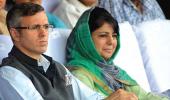

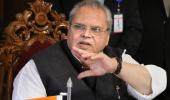





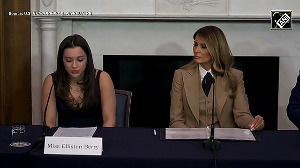
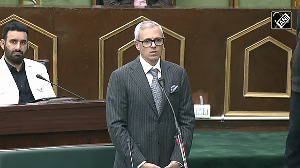
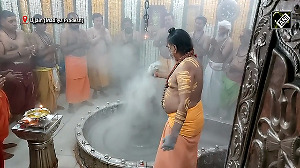
 © 2025
© 2025